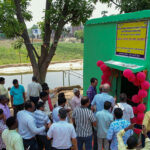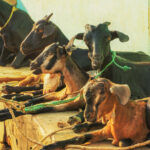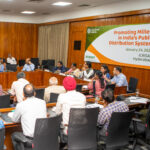Tag: Prabhu Pingali

TCI Inaugurates Bihar’s First Agrivoltaics Site
The Tata-Cornell Institute for Agriculture and Nutrition (TCI) and Preservation and Proliferation of Rural Resources and Nature (PRAN), along with Jain Irrigation Systems, celebrated the inauguration of an agrivoltaics installation in Bihar’s Gaya ji district on Monday, June 9. The…

TCI Scholars Celebrated During Cornell Commencement
Two TCI Scholars were recognized for their achievements during commencement ceremonies at Cornell University on Friday, May 23.
Shree Saha graduated with a Ph.D. in applied economics and management from the Dyson School of Applied Economics and Management. Shivranjani Baruah…

New Project Promotes Diverse Food Value Chains in India
In a food system, growing crops isn’t the end of the story; it’s not even the beginning. Before crops can be grown, seeds and other inputs must be purchased. After the harvest, crops may be processed or refined before moving…

Information Is Key to Ending Open Defecation
This policy brief presents the results of a study of the impact of toilet subsidies and behavior change communications on the practice of open defecation in rural India. TCI researchers conducted a cluster randomized trial of villages in Uttar Pradesh, providing one group of villages...

Information Is Key to Making India Open-Defecation-Free
Solving a problem like open defecation is not as simple as installing toilets. In 2019, after decades of work, India scored a major developmental victory by providing 600 million people with access to toilets. But while the toilets were built,…

Addressing Information and Credit Barriers to Making India Open Defecation Free and Improving Child Health: Evidence from a Cluster Randomized Trial in Rural India
Abstract Read a policy brief based on this study. Background Open defecation (OD) remains a significant public health challenge in India, contributing to adverse child health outcomes. Eliminating OD and improving child health necessitates both universal access and adoption of toilets. Despite the success of...

These Are the Keys to Promoting Artificial Insemination for Livestock
With the world’s population growing and dietary preferences changing, rising demand for animal-based food products like milk presents an opportunity for farmers in the developing world. Artificial insemination can help these farmers improve their productivity and increase their incomes, so…

Understanding the Determinants of Farmers’ Adoption of Artificial Insemination in Livestock
Abstract Read a policy brief based on this study. The adoption of artificial insemination (AI) in livestock is a crucial factor in enhancing breeding efficiency, livestock productivity, and income opportunities for farmers. However, the adoption of AI among farmers can vary significantly, influenced by a...

Smart Foods for Smarter Policies: Millets in India’s Public Distribution System
As India intensifies efforts to fight hunger and malnutrition, the Tata-Cornell Institute for Agriculture and Nutrition (TCI) and the International Crops Research Institute for the Semi-Arid Tropics (ICRISAT) are helping Indian policymakers with evidence-based strategies to include millet in the…

Chhattisgarh Can Reduce Ag Emissions Through Diversification
India has made enormous progress against hunger by incentivizing the production of staple grains like rice and wheat. Yet, as climate change advances, the country’s dependence on rice is becoming a burden due both to its large environmental footprint and…

